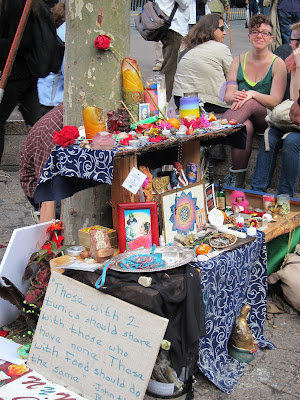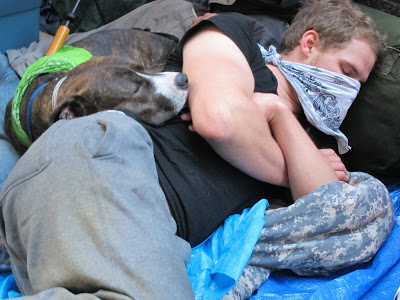"No one has the right to use America's rivers and America's Waterways that belong to all the people as a sewer. The banks of a river may belong to one man or one industry or one State, but the waters which flow between the banks should belong to all the people."—President Lyndon B. Johnson, signing the 1965 Clean Water Act
There's been a lot in the news lately about something called “fracking.” The natural gas industry and their customers benefit from it. But environmentalists and people who drink well water are fighting it. To understand why people love or hate it, let’s take a moment to explain just what it is.
Fracking is a slang term for hydro-fracturing, a process where water, sand and chemicals are injected into the earth at high pressure to fracture rock formations deep underground. This allows access to natural gas deposits that are playing hard to get.
Traditional drilling methods, used for over a century, brought gas to the surface simply by drilling vertically, with minimal environmental impact. (See "A," below.) However, most gas no longer resides in easily accessible reservoirs. Instead, it lies trapped within small fissures of rock. (See "B.") To extract the gas, vast amounts of water (with various chemicals added) are injected deep underground at extremely high pressure, thereby fracturing the rock (hence the term "fracking") and allowing the gas to escape. Sand injected along with the water helps to prop open the newly-created fissures (see "C.") and the gas can then rise to the surface through the fracking fluid.
"One effect of benefit-cost analysis is to give any respectable engineer or economist a means for justifying almost any kind of project the national government wants to justify… Exclusive reliance on benefit-cost analysis has been one of the greatest threats to wise decisions in water development."—Gilbert F. White, unpublished paper, Columbia University, March 21, 1971
What are the advantages of fracking?
What are the disadvantages of fracking?
As opposed to traditional drilling, fracking requires:
What is the stance of our altruistic Congress?
Is fracking being done in New Jersey?
Fracking has not yet been approved in New Jersey. It is currently being considered in Trenton, pending additional hearings. Environmentalists fighting the introduction of fracking into our small state have pointed to findings earlier this month by the EPA that fracking could cause groundwater pollution. The Delaware River Basin Commission is also looking into setting rules for fracking to safeguard the Delaware watershed.
State ratepayer advocate Stefanie Brand, describes cheap natural gas as a wonderful thing for ratepayers—but she wants savings to come with safety. "We have to see better (environmental) practices," Brand said in the Star Ledger, "Because we’re not solving any problem if the end result is contaminating our water supply."
Everything in life comes at a price. Are you willing to decrease the cost of your heating bills at the risk of contaminating your drinking water? If you go onto YouTube, you can see videos of people in other states lighting the water coming out of their faucets with a match. Not a pretty sight. This is a small state with a limited aquifer for drinking water. The question is: Are you feeling lucky?
There's been a lot in the news lately about something called “fracking.” The natural gas industry and their customers benefit from it. But environmentalists and people who drink well water are fighting it. To understand why people love or hate it, let’s take a moment to explain just what it is.
Fracking is a slang term for hydro-fracturing, a process where water, sand and chemicals are injected into the earth at high pressure to fracture rock formations deep underground. This allows access to natural gas deposits that are playing hard to get.
Traditional drilling methods, used for over a century, brought gas to the surface simply by drilling vertically, with minimal environmental impact. (See "A," below.) However, most gas no longer resides in easily accessible reservoirs. Instead, it lies trapped within small fissures of rock. (See "B.") To extract the gas, vast amounts of water (with various chemicals added) are injected deep underground at extremely high pressure, thereby fracturing the rock (hence the term "fracking") and allowing the gas to escape. Sand injected along with the water helps to prop open the newly-created fissures (see "C.") and the gas can then rise to the surface through the fracking fluid.
 |
| Illustrations are from from "Hancock and the Marcellus Shale: Gas Extraction Along the Upper Delaware" by The Earth Institute Columbia University Urban Design Lab. |
What are the advantages of fracking?
- An AARP Public Policy Institute analysis of heating costs for seniors found natural gas customers will average $542 to heat their homes this winter, fuel oil customers will average $2,675 and electric heat customers will average around $468, according to an article in the December 18, 2011 Star Ledger. (While oil prices rose in recent years, electric prices are tied to gas because of gas-fired power plants.) The increased supply—and therefore lower cost—of natural gas has come from fracking shale deposits in nearby states such as Pennsylvania
- The federal government projects that by 2035, 47 percent of gas produced in the U.S. will come from shale sources. That increased production is especially beneficial to New Jersey residents: 76 percent of New Jersey homes heat with gas, compared with 12 percent using fuel oil and kerosene and 11 percent that use electricity, according to Census Bureau data. (I, unfortunately, belong to the oil-poor group)
What are the disadvantages of fracking?
As opposed to traditional drilling, fracking requires:
- Vast amounts of water
- Various chemical lubricants, many of which are toxic. (Chemicals used in fracking are considered proprietary, and are therefore secret, ie, you're being poisoned on a need-to-know basis)
- The water used in fracking poses a major disposal problem. It ends up in reservoirs that can leak into groundwater
- There have been over a thousand instances of groundwater contamination in areas near fracking sites. Read all about it!
- Fracking has never been subject to an independent assessment of its environmental impact. (Although a study by the U.S. Environmental Protection Agency [EPA] is currently being conducted in Washington, amid the objections from the oil and gas industries)
- Fracking isn't subject to federal regulation. (This was accomplished via an EPA exemption pushed through Congress by then Vice-President Dick Cheney in 2005)
- The full long-term environmental impact of fracking is unknown. (What better reason to go full-speed ahead!)
What is the stance of our altruistic Congress?
- In a hearing on Capitol Hill last May, Republican members of the House Science, Space and Technology Committee struggled to make the case against an investigation by the EPA into fracking. The agency is already midway into its multi-year study
- Rep. Dana Rohrabacher (R-CA) recently protested that the agency should not even be conducting the study. During the hearing, he seemed to suggest that the EPA study wasn’t needed because not enough people have died to warrant an investigation, according to earthjustice.org. So does that mean the Congressman from California is admitting that some people have died as a result of fracking’s impact on the environment—but not enough of them?
- Rep. Brad Miller (D-NC) forced the Republicans’ star witness Michael J. Economides to admit that the oil and gas industry pays him about $1 million a year to testify on their behalf. So do you think he’d show up if the job were pro bono?
- A week before the May hearing, Duke University researchers unveiled a peer-reviewed study for publication in the Proceedings of the National Academy of Sciences that finds high methane levels in groundwater near where fracking has occurred. France’s conservative-controlled lower house of parliament took the first legislative step toward approving a nationwide ban on fracking. (So those pesky academics—and the French—are spoiling the fracking party due to some bothersome things called facts)
Is fracking being done in New Jersey?
Fracking has not yet been approved in New Jersey. It is currently being considered in Trenton, pending additional hearings. Environmentalists fighting the introduction of fracking into our small state have pointed to findings earlier this month by the EPA that fracking could cause groundwater pollution. The Delaware River Basin Commission is also looking into setting rules for fracking to safeguard the Delaware watershed.
State ratepayer advocate Stefanie Brand, describes cheap natural gas as a wonderful thing for ratepayers—but she wants savings to come with safety. "We have to see better (environmental) practices," Brand said in the Star Ledger, "Because we’re not solving any problem if the end result is contaminating our water supply."
Everything in life comes at a price. Are you willing to decrease the cost of your heating bills at the risk of contaminating your drinking water? If you go onto YouTube, you can see videos of people in other states lighting the water coming out of their faucets with a match. Not a pretty sight. This is a small state with a limited aquifer for drinking water. The question is: Are you feeling lucky?



















































